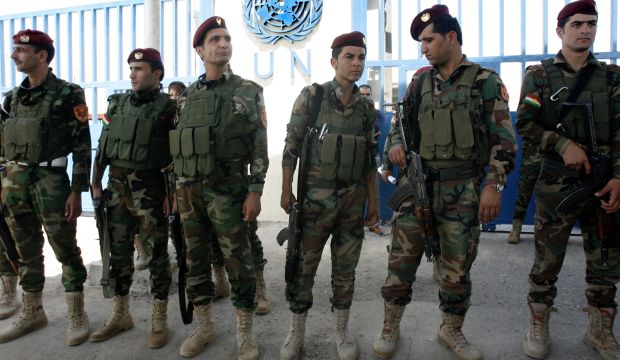
Kurdish soldiers stand guard as Yezidis displaced by fighting protest in front of the gates of the UN office in Erbil, northern Iraq, on August 4, 2014.(EPA/MOHAMMED JALIL)
Baghdad, Reuters—Kurdish forces attacked Islamic State of Iraq and Syria (ISIS) fighters just 25 miles (40 kilometers) southwest of the Kurdish regional capital of Erbil in northern Iraq, a senior Kurdish official told Reuters on Wednesday.
“We have changed our tactics from being defensive to being offensive. Now we are clashing with the Islamic State in Makhmur,” said Jabbar Yawar, secretary-general of the ministry of the Kurdish peshmerga fighters.
Yawar said the Kurds had re-established military cooperation with Baghdad.
Ties had been strained between the Kurdish leadership and the Shi’ite-led government of Prime Minister Nuri Al-Maliki over oil, budgets and land.
But a dramatic weekend offensive in the north by the Sunni militants prompted them to bury differences and work together against the biggest threat to Iraq’s security since the fall of Saddam Hussein in 2003.
In the surprise attack, ISIS militants overran a number of towns in north-west Iraq, reportedly expelling Kurdish peshmerga fighters with heavy weaponry seized from the Iraqi army when it abandoned its positions around Mosul in June.
The advances of the jihadist organization prompted tens of thousands of members of Iraq’s Yazidi minority to flee their homes in the area, after ISIS ordered them to convert to Islam, pay special taxes, or face execution.
Yawar said 50,000 Yazidis who fled the offensive and are hiding on a mountain near the town of Sinjar risked starving to death if they are not rescued in 24 hours.
“Many have already died,” he said without elaborating.
